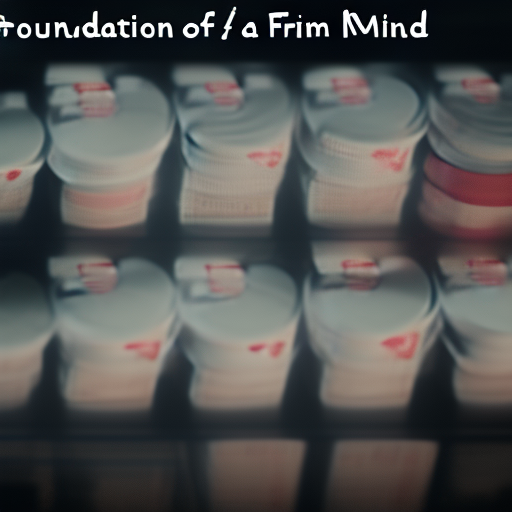Mastering the game of poker requires many different skills. Mental strength, intuition, and intuition are all essential for a strong poker strategy. But, at the core of all of them is the foundation for a solid poker mind. With the right foundation, it’s possible to enhance all of your abilities, giving you an edge over your competition. In this article, we’ll take a look at the importance of building a firm poker mind, and how you can make that a reality.
1. Understanding Poker’s Fundamental Principles
Poker is a game of strategy, skill and luck. It’s a game where players need to make decisions based on incomplete information and it’s often the player who can read the other players the best, who comes out on top. The fundamental principles of poker are the foundation upon which your game is built. Understanding them is key if you want to become a great player.
One of the most important principles of poker is the concept of pot odds. This is simply the ratio of the amount of money in the pot compared to what it will cost you to call a bet. If the pot odds are in your favor, then it’s often a good idea to call the bet. Another important principle is position. Being in position means that you act after your opponents, giving you an advantage. You can make more informed decisions because you have more information about what your opponents are doing. Keep these principles in mind and you’ll be on your way to becoming a better player.
2. Making Use of Math and Game Theory
In the world of business, math and game theory are powerful tools that can be used to gain strategic advantage. Math enables you to analyze data and make informed decisions, while game theory helps you understand how other players will respond to your moves. Together, they can help you build strong strategies and make better business decisions.
Using math, you can make predictions about future trends, analyze data and identify patterns, and calculate the potential payoff of different options. Game theory, on the other hand, teaches you how to anticipate the behavior of other players and use that information to your advantage. By studying the actions and reactions of your competitors, you can develop strategies that will help you stay ahead. Incorporate these techniques into your business practices, and you’ll be amazed at the results.
3. Mastering the Mental Aspects of Poker
When we talk about poker, one of the most essential skills to master is mental strength. You need to understand that this game is more than just a game of cards; it’s a game of minds. Here are some tips that will help you master the mental aspects of poker.
- Stay Focused: It’s essential to stay focused on the game and avoid distractions, which can impact your decision-making ability. Whether you’re playing online or at a live table, eliminate all distractions, including your mobile phone and other irrelevant things.
- Manage Your Emotions: Temperament is a vital skill in poker. You need to keep your cool even when things are not going your way. Your emotions can impact your decision-making ability, so keep your mind calm and clear.
Remember that victory and defeat are temporary in poker. There are high times and low times, and managing your emotions and staying focused will help you make the right decisions and win more games consistently.
4. Building Up Enduring Poker Confidence
One thing that separates professional poker players from amateurs is confidence. Confidence isn’t something you can build overnight, but it’s a skill you can work on and improve with practice. Here are some tips to build confidence in your poker game:
– Focus on the process, not just the outcome. Don’t just evaluate your results at the end of each session; instead, look at the small decisions you make leading up to those results. Did you make the best decision possible with the information you had? If so, then you can be confident in your play, regardless of the outcome.
– Learn to trust your instincts. If you have a gut feeling about a play, don’t ignore it. While it’s important to make decisions based on logic and probability, there are times when your intuition can lead you in the right direction. If you’re unsure about a decision, take a moment to listen to your gut before making a move.
Remember, building confidence takes time and practice. But with consistent effort, you’ll start to see improvements in your play and your mindset. Don’t be afraid to set small goals for yourself and celebrate your wins along the way. Soon enough, you’ll have the enduring poker confidence you need to succeed at the table. Start to build a firm foundation for your poker mind today, and you will be sure to experience a newfound respect for the game and yourself. You can take the game of poker from a leisurely pastime to a professional sport with some self-discipline, patience and a commitment to continual learning. Whether you choose to use your newfound poker skills as a hobby or a profession is up to you! So roll up your sleeves and let the game begin.